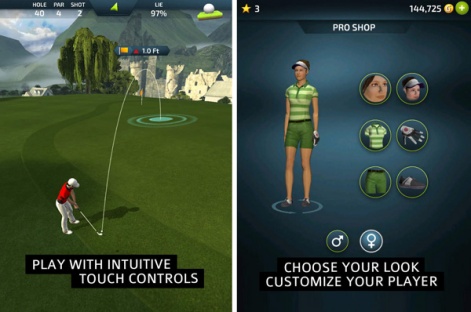Despite being one of Canada's most experienced and largest game studios, Behaviour Interactive isn't a household name.
That's because the majority of its games have been work-for-hire projects: something that's also been the case with its recent mobile games.
This situation is about to change, however, as the Montreal outfit prepares to come out of the shadows with the launch of mobile games Pro Feel Golf as well as one based on the forthcoming Dreamworks' animation HOME, not to forget its acquisition of existing mobile brands like Zombie Farm.
We spoke to executive producer, mobile publishing Jimmy Gendron about the opportunities and challenges the company faces in 2015.
Pocket Gamer: Behaviour is known mainly for its big PC/console projects so why is mobile now an interesting business opportunity for the company?
Jimmy Gendron: Behaviour has produced multiple top grossing games on iOS/Android in the last few years as a work-for-hire partner for established publishers, so mobile is not new for our teams.
We've been active in the mobile industry since the launch of the first iPhone and have had an insider's view on how mobile top hits are produced. Coupled with the emergence of the app stores, which enabled large indie developers to self publish, the decision to begin investing as a mobile publisher last year made sense.
Most games don't have a user acquisition challenge: what they have is a monetization challenge.Jimmy Gendron
I think Behaviour is uniquely positioned to be successful in the mobile space, thanks to our 20+ years heritage in game development across all platforms, our industry connections and the skills of the 325+ passionate staff in the Montreal and Chile studios.
I like to say that we have the strengths of the major players, combined with the agility and focus of an independent studio. That's what was exciting about the opportunity to join this company, after having spent my last 10 years with EA Mobile.
What parts of your experience as a PC/console developer do you think will be most relevant when it comes to being a successful mobile game company?
We approach mobile from the perspective of an experienced triple-A developer. What we do is mobile triple-A.
I'm obviously not talking about triple-A in terms of console budget, I'm talking about the quality of gameplay and its creative/art execution. Those key pillars become increasingly important on mobile as devices become more powerful and users demand better games.
Behaviour has produced over 140 titles across all platforms, so we've got deep experience to pull from. I'm amazed by how much we really are a game incubator.
Every time we talk about a game idea on mobile, the team comes up with multiple examples of projects we've built and games we've all played. That deep experience from the group becomes a competitive advantage when it comes to executing on mobile.
To-date, you've developed some mobile games based on big Disney and Warners IP. What have you learned from these projects?
As a company, Behaviour has developed multiple movie-based games across all platforms. We were an international leader in family licensed games for PCs and consoles even before the emergence of digital distribution and mobile as we know it today.
That leadership and experience translated well to the mobile platforms and the freemium business models. We still work with many movie licenses, and in general IP-based games are still the majority of our work-for-hire business. As a result, we have a lot of experience collaborating with the licensing partners, working with their properties and finding the right formula to make those products a success.

What's new for us, as in the rest of the industry, is to learn how to launch and operate live game services at scale. Now it's not just about getting a title to gold master and shipping on a disk. Launching is only the beginning.
We've had to learn and continue optimizing how to operate those scalable services on the product side, analytics, social media, and for customer service. It's about the full stack now, committing to it on the long term.
You've currently got Pro Feel Golf in soft launch. Why did you decide to develop a golf game and why do you think this simulation approach to golf will work on mobile?
Behaviour has more than a few die hard golf fans, our CEO and head of creative among them... They play as regularly as Canadian weather allows and have played every golf game out there for over 30 years.
We saw an opportunity for an accessible game built for mobile, specifically for touch, and there was no real appealing proposition on iOS/Android that didn't feel like a console down-port. Our goal was to take something traditionally complex to play and simplify it while keeping the gameplay true to the sport.

After receiving positive feedback on our prototype conducted via focus/user tests, we took the decision to produce the game. We think it was the right decision when looking at the metrics during soft launch, and are excited about the upcoming worldwide release in the next few weeks.
Live operations is the most important aspect of having a successful mobile game, so what are your plans in terms of keeping Pro Feel Golf's audience retained?
We took the decision to soft launch for 3 months in Ireland and Canada with the goal of polishing and refining the game experience, and analysing the metrics to tell us what the players were enjoying the most in our game.
Our strategy is to go fewer but better.Jimmy Gendron
Based on the analysis and the community feedback during this period, we have developed our live support plan for the upcoming months.
Our live operations will rely on a strong and dedicated community management, regular multiplayer live events and a well-paced delivery of new content including avatar items, new golf courses and equipment.
You're working with Dreamworks over its HOME movie. Why did you think that franchise would translate well in mobile, and why are so many mobile gaming companies investing in blockbuster licences?
Movie licenses have existed since the beginning of the gaming industry. For us, we had an innovative gameplay idea we wanted to execute on and found that the HOME movie universe was a perfect pit.
On mobile, I think the budgets and schedules enable the delivery of great products on a platform with an unprecedented scale for distribution. All major studios are aware of this now, as mobile games have become both a source of profit as well as a strong platform for marketing.
For licensee partners, the primary reason to work with licensors is to leverage the marketing power of a movie or TV show, and ideally harness the fan base of established franchises. However, I see too many licensee partners who rely only on the licensor's marketing and not investing into their own user acquisition.
Working with a license helps, but doesn't entirely remove the needs to incrementally spend on marketing.
As well as developing mobile games internally, you're planning to publish thirdparty games. Given you're relatively late to enter the app store era, why do you think you can be a success as a game publisher?
I should start by saying that it's not our core business. We don't have a specific target as to how many thirdparty games we want to publish every year. We will partner with other developers to publish their games when the right opportunities arise.
I'm talking with several developers right now, and most of the time they don't come to us for a traditional publishing discussion. They will come to us asking for suggestions or looking for help to finish and operate their products. Very often, they come to us to improve their game proposal for larger publishers. If we see potential in their products, that's when we jump in.
We look at this as deeper partnerships, I would qualify this more as co-development relationships with us managing the traditional publishing tasks. We offer a unique proposition since we can provide full stack of support, starting from client/server development, art, design, QA, up to user acquisition, analytics, PR and customer service.
We speak the same languages as other developers do since we are one ourselves.
When it comes to sourcing mobile games to publish, what sort of games/genres are you looking for?
We are in talks with both local developers as well as others located as far away as Asia, so location is not a factor.
What we look for are great concepts with at least a playable prototype. It's even better if the product is in soft launch, however, I like to get involved early since this is when we can offer the most value being a developer ourselves.
We are interested in most genres, since we have the experience internally. I think there will always be opportunities to innovate across game genres, even the crowded ones. Vainglory is a great example for MOBAs, and obviously Hearthstone with CTGs.
User acquisition is a big part of mobile game publishing, but it's also very expensive. What strategies do you have to overcome this challenge?
I like to focus on the products first, making sure that they are innovative and resonate well with their target audience. If you do this right, your players become your best ambassadors and industry partners will generally give you great support (reviews, platform support, etc).
What’s new for us is to learn how to launch and operate live game services at scale.Jimmy Gendron
We want to make sure we maximize the organic and viral traffic by delivering great innovative games. Pro Feel Golf is a great example of that. With that being said, we recognize UA is part of the mix. We have great team of UA experts managing and optimizing networks.
I think most games don't really have a user acquisition challenge: what they have is a monetization challenge. User acquisition is a very competitive space, where you bid for users against games with increasing LTVs. As a result, our primary focus is on optimizing the lifetime value in our games since the UA costs will keep rising over time as games and brands increasingly pay more for the same eyeballs.
Additionally, we have a large focus on licensed properties, with more announcements to come in the future. We already have strong relationships with the major IP holders thanks to our 20+ years in the game business, and we're leveraging that.
How many games do you expect to developer internally and publish during 2015?
We plan to release 4 to 5 games in 2015. Our strategy is to go fewer but better.
Coming from EA Mobile, I know the value of focus even when you have lots of staff and financial resources. With the increased competition on mobile, we want to select the right opportunities and be focused on their execution.






















